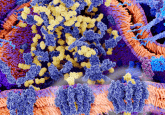Researchers design nicotine vaccine that demonstrates significant immune response

A study published in the Journal of Medicinal Chemistry has put forward a design for a new nicotine vaccine, demonstrating that the structures of molecules used are critical to its efficacy. The research, carried out by scientist at The Scripps Research Institute (TSRI; CA, USA), comes after the failure of a promising nicotine vaccine in clinical trials a few years ago.
The National Cancer Institute (MD, USA) claims that smoking is the leading cause of eight types of cancer, including lung and fast-moving pancreatic cancer. The aim of nicotine vaccines is to train the body’s immune system to recognize the chemical as a foreign invader. Scientists at TSRI have attached nicotine derivatives termed haptens to a carrier protein, already in use in other approved vaccines, to prompt an immune response.
The intention is for the body to react to the presence of the vaccine by producing antibodies, which bind selectively to nicotine molecules. When the vaccinated person later uses tobacco, the anti-nicotine antibodies prevent the chemical from entering the central nervous system and reaching the brain.
Though the vaccine wouldn’t prevent withdrawal symptoms, it would prevent the brain’s reward system from responding to nicotine, and therefore decrease the likelihood of the patient relapsing. The previous failed vaccine was nonspecific, targeting both forms of the nicotine molecule, something that TSRI believes was a wasted immune response and responsible for the poor efficacy of the treatment. The researchers involved in the new study experimented with both ‘left-handed’ and ‘right-handed’ versions of the nicotine molecule.
In trials with rats, they found that the left-handed hapten vaccine elicited a more effective immune response than control, right-handed, or a 50–50 mix of both right and left-handed vaccines. Jonathan Lockner, Research Associate at TSRI and first author of the paper, explained: “This shows that future vaccines should target that left-handed version. There might even be more effective haptens out there.”
“The study provides new hope that one could make a nicotine vaccine that succeeds in clinical trials,” explained Kim Janda, Ely R Callaway Jr Professor of Chemistry and member of the Skaggs Institute for Chemical Biology at TSRI. Janda also believes considering molecule handed-ness is essential in the development of vaccines against other drugs of abuse.
Source: TSRI scientists design nicotine vaccine that provokes robust immune response.





